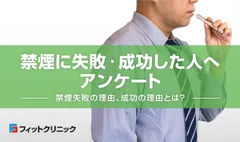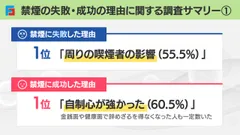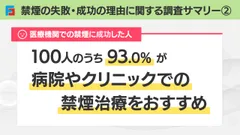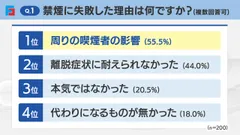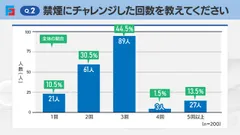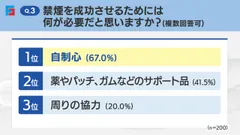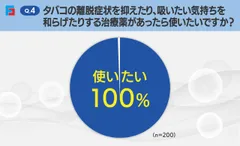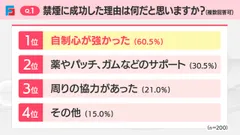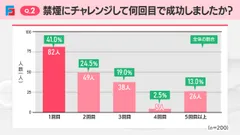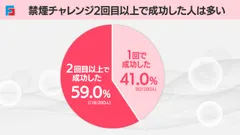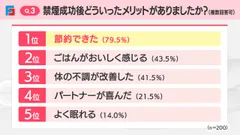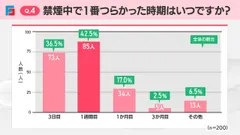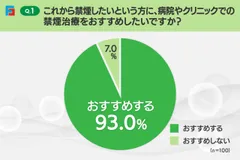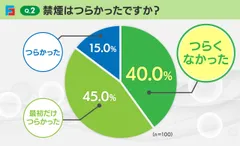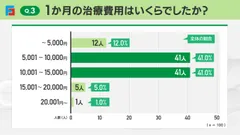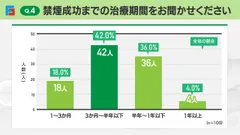Questionnaire for those who failed or succeeded in quitting smoking: The No. 1 reason for failure to quit smoking is "influence of smokers around me, The No. 1 reason for success was "I had a strong sense of self-control.
~93% of respondents who have successfully quit smoking after undergoing smoking cessation treatment would recommend smoking cessation treatment to someone who is about to quit smoking.
General Incorporated Association Medical Fit
Fit Clinic (Location: Shibuya-ku, Tokyo; URL: https://fit.clinic/ ), operated by Medical Fit, a general incorporated association, conducted a questionnaire on reasons for failure and success in quitting smoking for those who have failed, succeeded, or quit smoking at a medical facility.
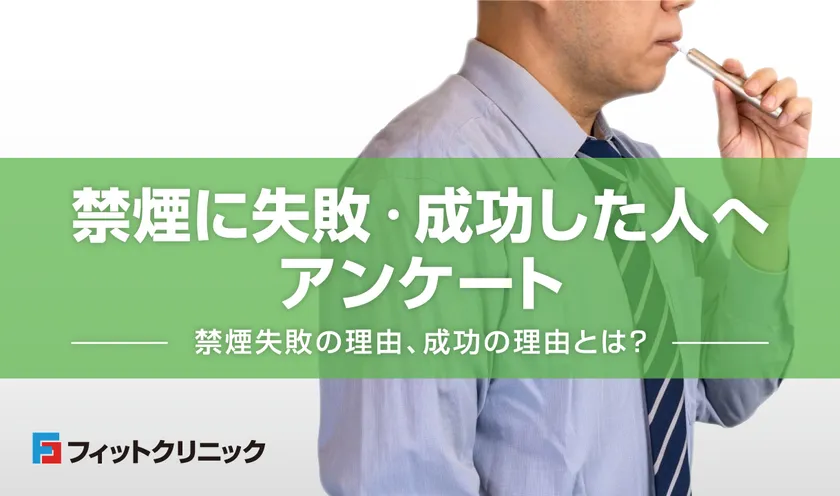
Questionnaire for those who failed or succeeded in quitting smoking
In recent years, rising cigarette prices and fewer public smoking spaces have made smoking more difficult than ever before.
In addition, the growing health-consciousness that resulted from the experience of the Corona disaster and the enactment of ordinances by local governments to prevent smoking on the streets have increased public awareness of the need to quit smoking.
However, many people who have smoked for a long time experience severe withdrawal symptoms when they try to quit smoking and are unable to quit as they wish.
To investigate what it takes to successfully quit smoking, we conducted a survey of people who have both failed and succeeded in quitting smoking.
Outline of the survey
Survey subjects: 200 people who failed to quit smoking and 200 people who succeeded in quitting smoking,100 people who succeeded in quitting smoking at a medical institution.
500 people in total.
Survey date: October 24, 2023
Survey method: Internet survey
■Survey Results Summary
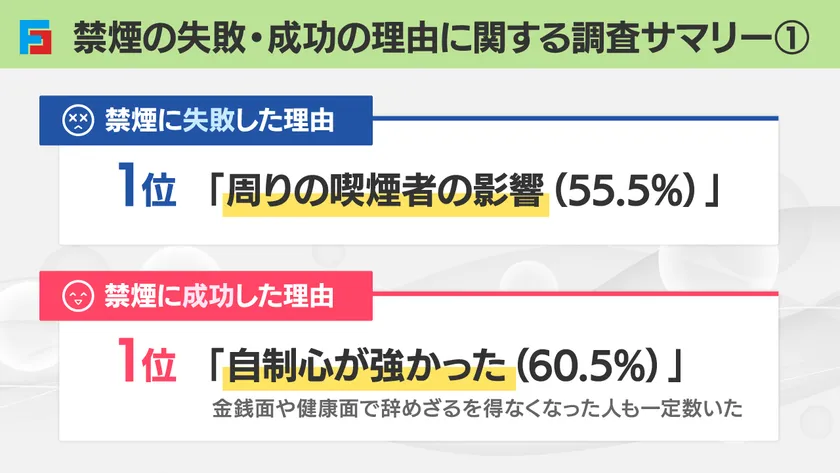
Survey summary on reasons for failure/success in quitting smoking (1)
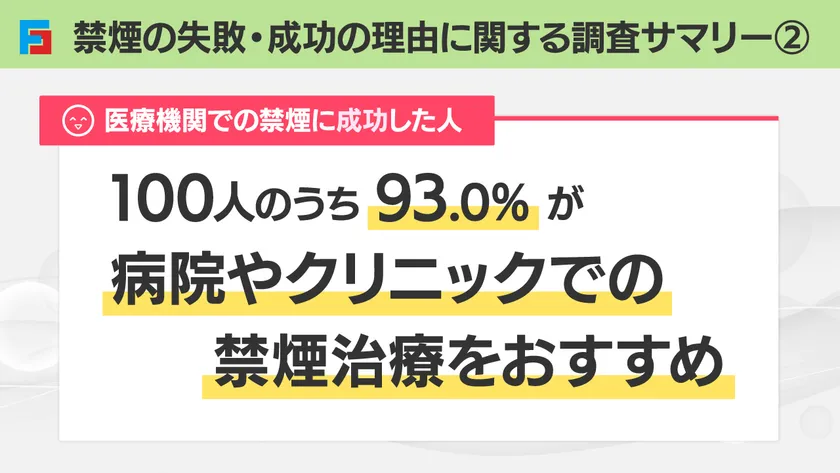
Survey summary on reasons for failure/success in quitting smoking (2)
Details of the survey results
Questionnaire for those who have failed to quit smoking
Q1: What were the reasons for your failure to quit smoking? (Multiple answers allowed)
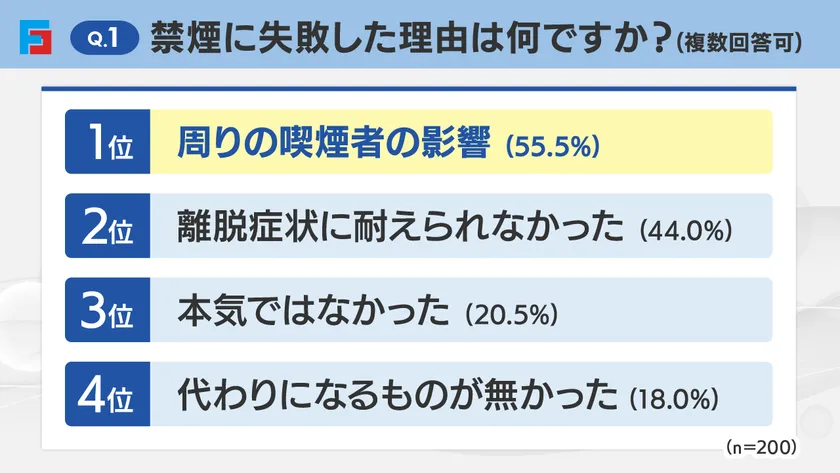
Q1: Why did you fail to quit smoking?
Other answers:
・I smoked as usual when I was a little distracted.
・I was able to quit smoking, but I smoked again on a whim.
・I smoked when I was frustrated.
・I smoked again when I felt like smoking.
When asked why they failed to quit smoking, the most common reason was "Influence of smokers around me (55.5%)," followed by "Could not stand withdrawal symptoms (44.0%)," "Was not serious (20.5%)," and "Had nothing to replace it (18.0%).
It seems that many people suddenly feel the urge to smoke when a smoker is nearby. Therefore, it seems that in order to succeed in quitting smoking, physical measures such as distancing oneself from smokers or missing drinking sessions may be necessary.
Q2: How many times have you tried to quit smoking?
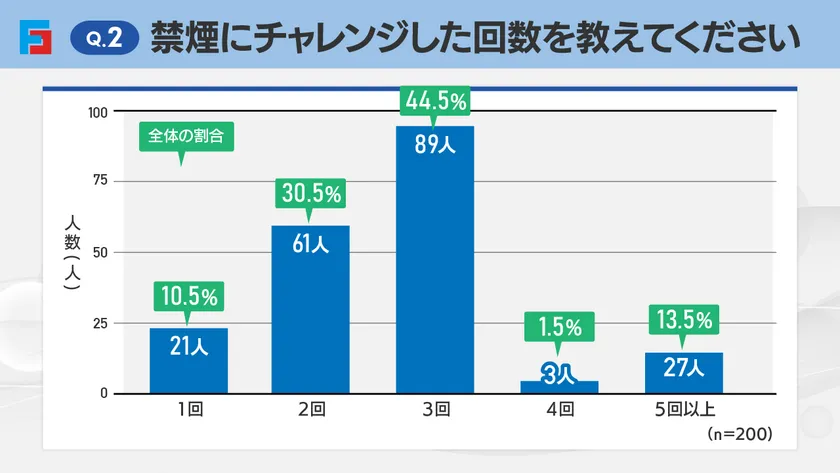
Q2: Number of times you have tried to quit smoking
When asked how many times they have tried to quit smoking, "3 times (44.5%)" was the most common response. The next most common response was "twice (30.5%).
Some respondents had tried five or more times (13.5%), indicating that overall, about 90% of the respondents had failed two or more times.
This shows how difficult it is to quit smoking.
Q3: What do you think is necessary to successfully quit smoking? (Multiple answers allowed)
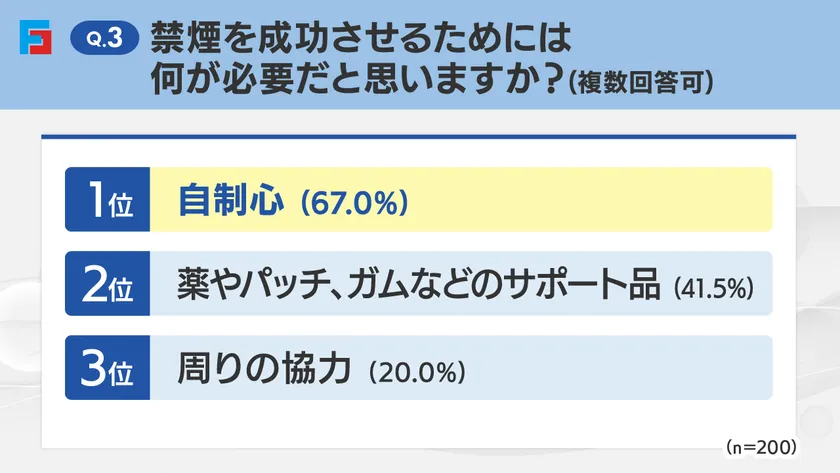
Q3: What is needed to quit smoking successfully?
Other answers:
・Keep tobacco related items away from your surroundings as much as possible.
・Stop smoking after meals, etc.
・Improvement of lifestyle
・Circumstances that put me in a difficult situation
When asked what they thought was necessary to successfully quit smoking, the most common response was "self-control (67.0%)," followed by "support products such as medicine, patches or gum (41.5%)" and "cooperation from others (20.0%).
A certain number of respondents thought that having a strong sense of self-control that is not influenced by other smokers around them and that is not affected by withdrawal symptoms is a prerequisite for success in quitting smoking, and that getting support from others and items to help them quit smoking will lead to even greater success in quitting.
Q4: If there were a remedy that could reduce withdrawal symptoms or ease the desire to smoke, would you want to use it?
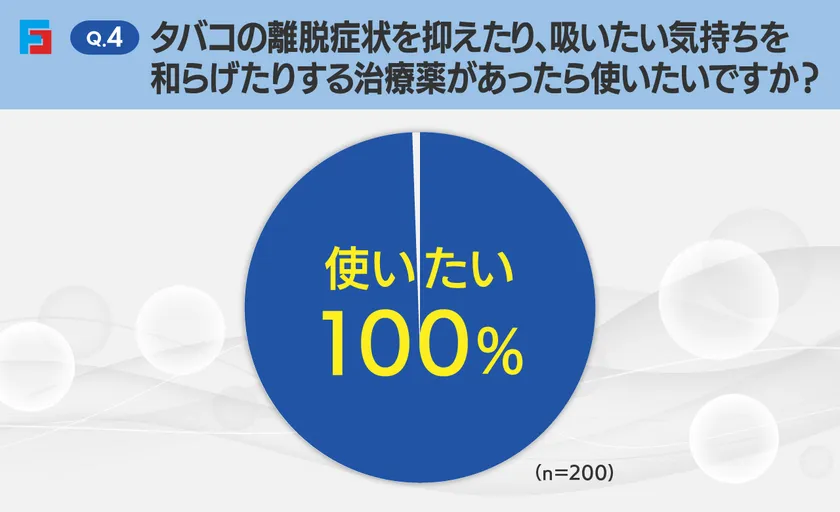
Q4: If there were a medication that could reduce withdrawal symptoms and other symptoms, would you want to use it?
When asked if there was a medication that could reduce withdrawal symptoms or ease the desire to smoke, all 200 respondents said they would like to use it.
This shows how withdrawal symptoms are a detriment to smoking cessation.
However, there are actually such cessation medications available, but many people try to quit smoking without knowing it.
Smoking cessation medications are an option that should be considered only by those who are not confident in their ability to control themselves or those who have not been able to tolerate withdrawal symptoms.
Summary of the results of a survey of people who failed to quit smoking
The most common reasons for failure to quit smoking were "influence of other smokers" and "withdrawal symptoms.
In many cases, people who have tried multiple times to quit smoking have not been successful.
Many respondents thought that "self-control" and "smoking cessation support products" were necessary to succeed in quitting smoking.
If there was a medicine that could reduce withdrawal symptoms and the desire to smoke, all 200 respondents said they would like to use it.
The above results indicate that "strong self-control not to be influenced by smokers around them and not to be overcome by withdrawal symptoms" is important for success in quitting smoking.
It seems that it is necessary to deal with smokers around you according to the situation, such as telling them that you are quitting smoking and keeping a physical distance from them.
In addition, for withdrawal symptoms, there are indeed smoking cessation medications that suppress symptoms.
Therefore, those who have difficulty in successfully quitting smoking should first consult a specialized medical facility.
Questionnaire for those who have successfully quit smoking
Q1: What do you think is the reason for your success in quitting smoking? (Multiple answers allowed)
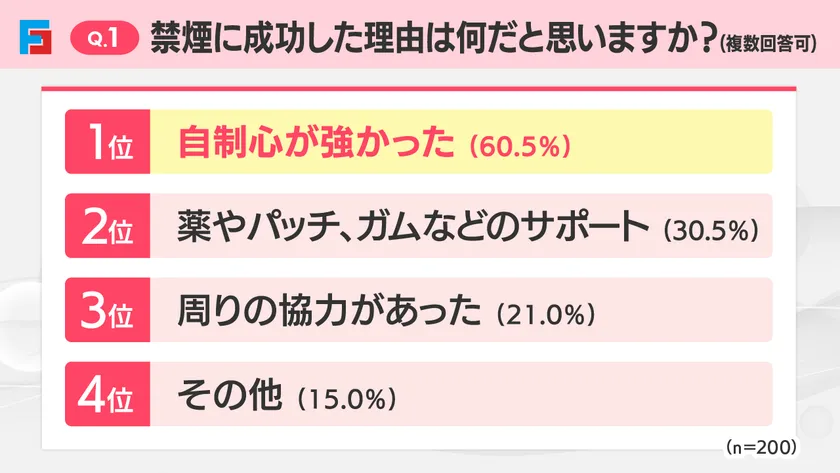
Q1: Reasons for successfully quitting smoking
Other answers:
・I can no longer buy cigarettes due to financial hardship.
・Decided to try harder to quit smoking because the rising cost of cigarettes was becoming a burden
・Pregnancy forced me to quit smoking.
・I used to say, "I can't quit unless I get sick," including jokingly, and I really got sick and quit smoking.
・One day, I suddenly felt abnormally cold on the right side of my body, so I went to the hospital and was told in a very strong tone, "Please quit smoking for now.
・I wanted to take a long flight.
When asked what they thought was the reason they succeeded in quitting smoking, the most common response was "I had strong self-control (60.5%)," followed by "support from medications, patches, gum, etc. (30.5%)" and "I had cooperation from others (21.0%).
This question received more "other" responses than the other questions, but mainly respondents indicated that financial problems, health problems, pregnancy, or other "circumstances that forced me to quit smoking" led them to quit smoking.
Q2: How many times have you tried to quit smoking and succeeded?
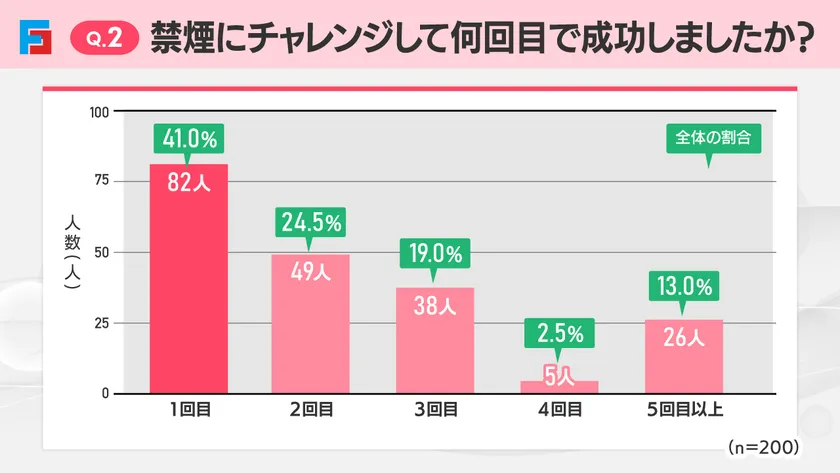
Q2: How many times did you succeed after trying to quit smoking?
When asked how many times they succeeded after trying to quit smoking, the most common response was "the first time (41.0%).
It seems that those who are able to quit smoking once and for all are able to do so after only one attempt.
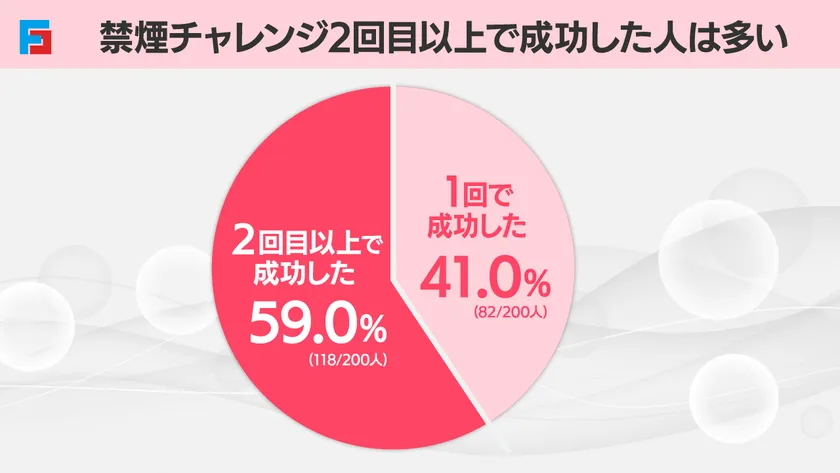
Many people succeeded in their second or more attempts to quit smoking.
However, when the results are divided into "first time" and "second time or more," those who succeeded at the second time or more are in the majority.
Therefore, even if you do not succeed in quitting smoking the first time, there is no need to feel depressed that you have failed or to give up.
Q3: What benefits have you experienced after successfully quitting smoking? (Multiple answers allowed)
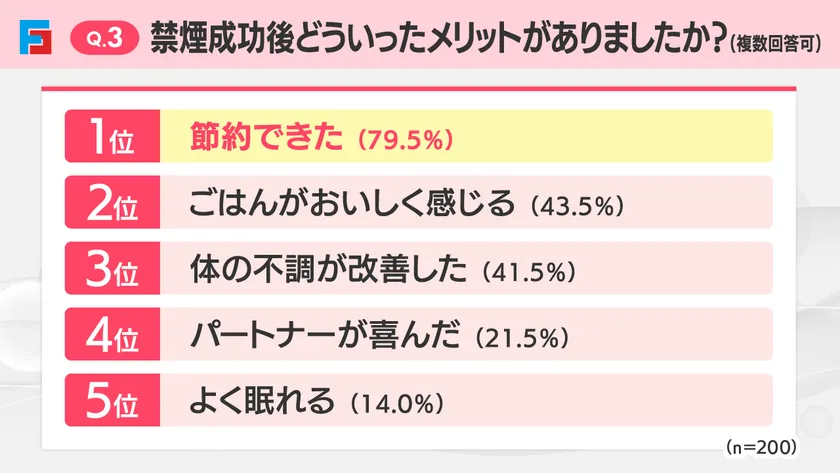
Q3: What benefits did you feel after successfully quitting smoking?
Other answers:
・The room is no longer stained with cigarette smoke, and it is easier to wipe it clean.
・Body odor and bad breath have improved.
・Saved time wasted looking for a smoking place.
・I can now use the time I have to smoke for other things, like work.
・My confidence has increased.
When asked about the benefits after successfully quitting smoking, "I saved money (79.5%)" was selected by an overwhelming 80% of the respondents. Other responses included "Food tastes better (43.5%)" and "My health condition improved (41.5%).
Other responses included improved body, mouth, and room odors and time savings, indicating that those who have quit smoking are experiencing benefits in many areas.
Q4: When was the hardest time for you when you quit smoking?
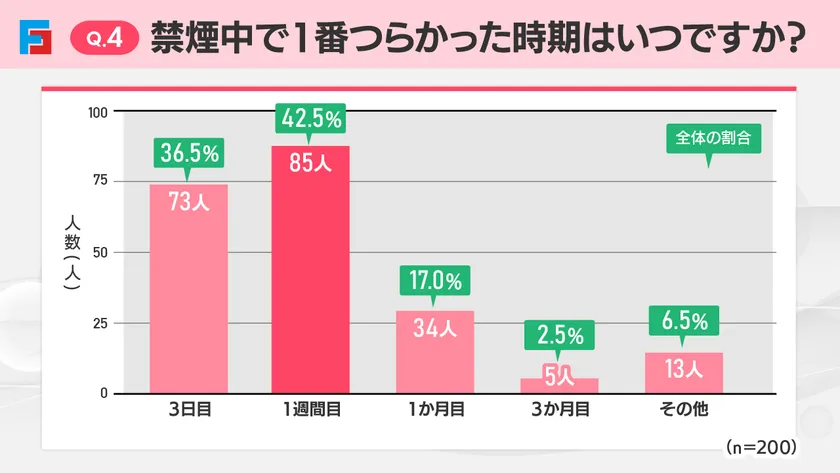
Q4: When was the hardest time for you when you quit smoking?
Other answers:
・It was not so much the time of year, but the timing of drinking parties, etc.
・It was hard all the time until I got used to the new habit, and I thought it would be all the time until I lost interest in smoking.
・I felt that I could return to smoking anytime after smoking one cigarette for about three years after quitting.
・Surprisingly, I didn't get the impression that it was hard for me.
・Thanks to the effects of the medications I was taking for smoking cessation treatment, I never thought it was hard.
Regarding the most difficult period during the smoking cessation, the most common answer was the first week (42.5%), followed by the third day (36.5%) and the first month (17.0%).
These results suggest that the first week tends to be somewhat easier once one gets through the first week.
In other responses, several respondents said, "It's not so much the 'hard time' but the 'timing'". Since they feel the urge to smoke in certain situations, such as while drinking or driving, it seems that it would be a good idea to take measures such as avoiding those situations.
Another said, "I didn't think it was hard because of the effects of the smoking cessation medication," indicating that the use of medication reduces the difficulty of quitting smoking.
Summary of the results of a survey of people who have successfully quit smoking:
・The most common reasons for success in quitting smoking were "I had a strong sense of self-control" and "Supportive products such as medicines.
・The majority of respondents succeeded the first time they quit smoking, but the majority succeeded the second time or more.
・Nearly 80% of respondents felt that they saved money as a benefit after quitting smoking.
・The hardest time to quit smoking was the first week.
From the comments of those who actually succeeded in quitting smoking, we learned that "self-control" and "support products such as medication" are necessary for success in quitting smoking.
Some people feel self-loathing if they do not succeed in quitting smoking the first time, but there is no need to worry because many people succeed after two or more attempts. To prepare yourself, remember that "the first week is the critical point" and you may be more likely to succeed.
Also, considering that a pack of cigarettes costs 600 yen, quitting smoking will save you 18,000 yen in one month, or 219,000 yen in 365 days. It is therefore understandable that "I saved money" is the most common benefit.
These results show that there are indeed many benefits to quitting smoking.
Questionnaire for those who have successfully quit smoking at a medical institution
Q1: Would you recommend smoking cessation treatment at a hospital or clinic to someone who wants to quit smoking?
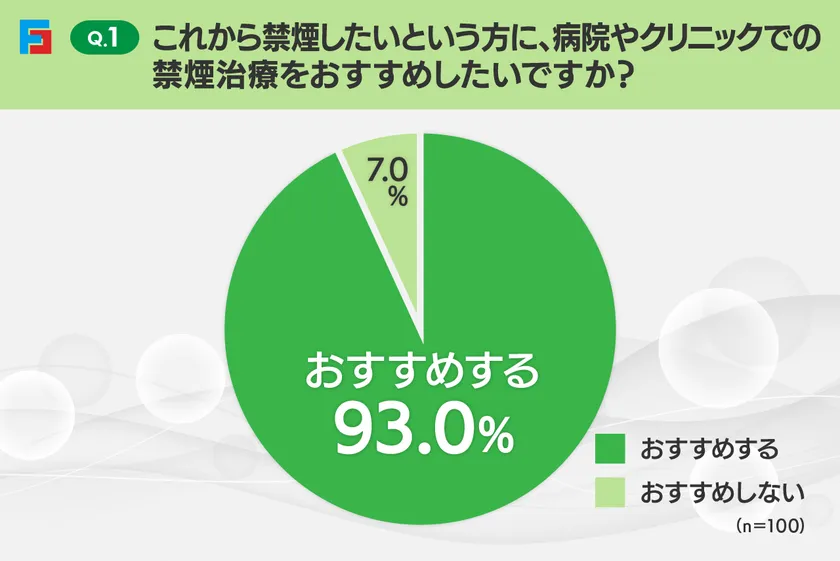
Q1: Would you recommend smoking cessation treatment
When those who have successfully quit smoking at a medical institution were asked if they would recommend smoking cessation treatment at a hospital or clinic to those who are thinking about quitting smoking in the future, 93.0% said they would.
This result indicates that smoking cessation treatment was effective for many people.
Q2: Was it hard for you to quit smoking?
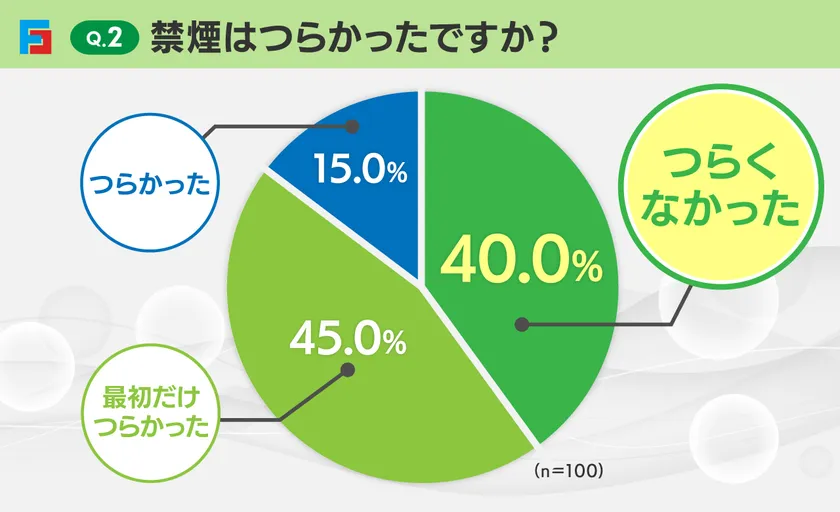
Q2: Was it hard to quit smoking?
When asked if quitting smoking was hard for those who had successfully quit smoking at a medical facility, the most common response was "It was hard only at first (45.0%).
On the other hand, 40.0% said it was "not hard," indicating that one of the benefits of smoking cessation treatment, "suppression of withdrawal symptoms," actually minimized the impact.
Q3: How much did one month of treatment cost?
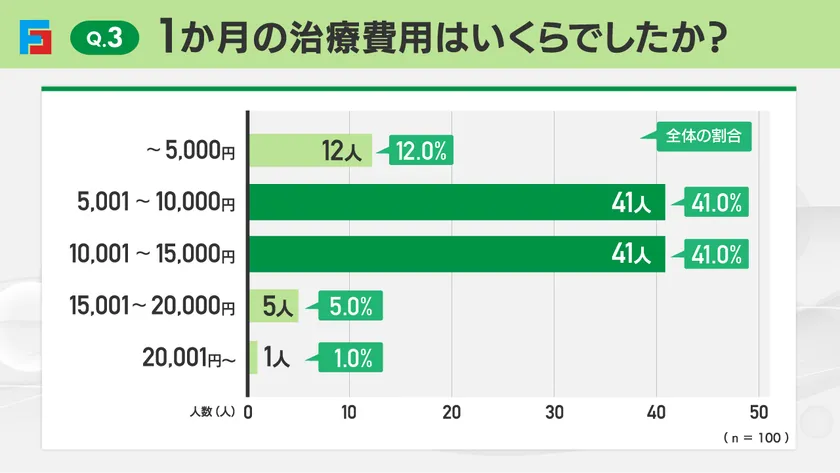
Q3: Cost of one month of smoking cessation treatment
When we asked how much a month of treatment cost, we found that 80% of all respondents were in the 5,000-15,000 yen price range.
Since the cost of smoking cessation treatment varies depending on insurance or free treatment, the amount may vary.
Also, considering that smoking a pack of cigarettes worth 600 yen a day would be 18,000 yen per month, it is clear that smoking cessation treatment is cheaper than smoking cigarettes.
Q4: How long does it take for treatment to be successful in quitting smoking?
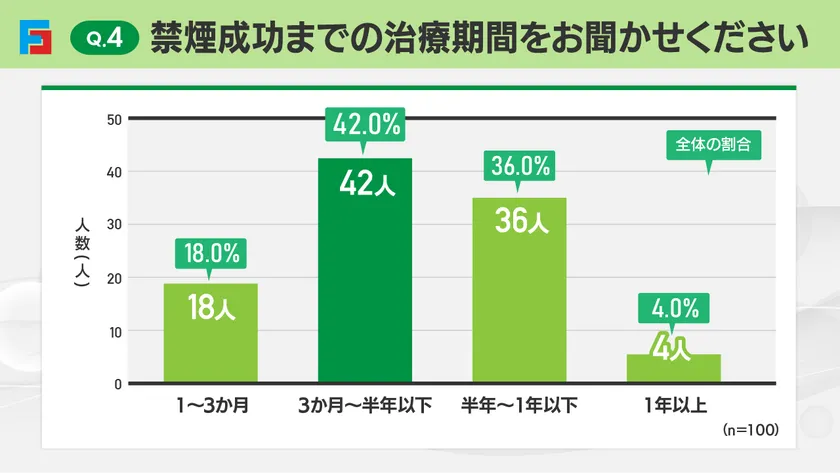
Q4: How long does it take to successfully quit smoking?
When asked about the length of treatment until smoking cessation success, we found that "3 months to less than 6 months" was the most common response, at 42.0%. This was followed by "six months to one year or less" at 36.0%.
In other words, the survey showed that nearly 80% of those who successfully quit smoking at a medical institution did so within a year.
Summary of survey results for those who have successfully quit smoking at a medical facility:
・93% recommend quitting smoking at a medical institution to those who will quit smoking in the future.
・The majority of respondents said "It was hard only at the beginning" and "It was not hard at all," while 15% said "It was hard.
・80% of the respondents said that the monthly cost of treatment was in the range of 5,000 yen to 15,000 yen.
・40% of respondents succeeded in quitting smoking after six months, and nearly 80% after one year.
We found that smoking cessation treatment at a medical institution is more likely to lead to success in quitting smoking because it reduces withdrawal symptoms, which are a difficult part of quitting smoking.
Regarding the cost of treatment, if the cost of cigarettes is 18,000 yen per month, it can be read that treatment is cheaper. Considering that the cost of cigarettes will float if the treatment is successful, it can be said that starting a smoking cessation program is itself a way to save money.
■In response to the results of the survey
We conducted a survey of both those who failed and those who succeeded in quitting smoking, and both agreed that "self-control" is necessary for quitting smoking.
In addition to appropriate measures to deal with situations that require self-control, it can be said that the secret to success is to use supportive items to prevent the need for self-control in the first place.
More than 90% of people who have successfully quit smoking through treatment at a hospital or clinic recommend treatment at a medical institution, so please consider this if you are having trouble quitting smoking or if you want to quit smoking without the burden of withdrawal symptoms.
In addition, Fit Clinic also prescribes smoking cessation medications to help you quit smoking as successfully as possible.
If you are having trouble quitting smoking because you cannot tolerate withdrawal symptoms, please contact our clinic.
About the Fit Clinic
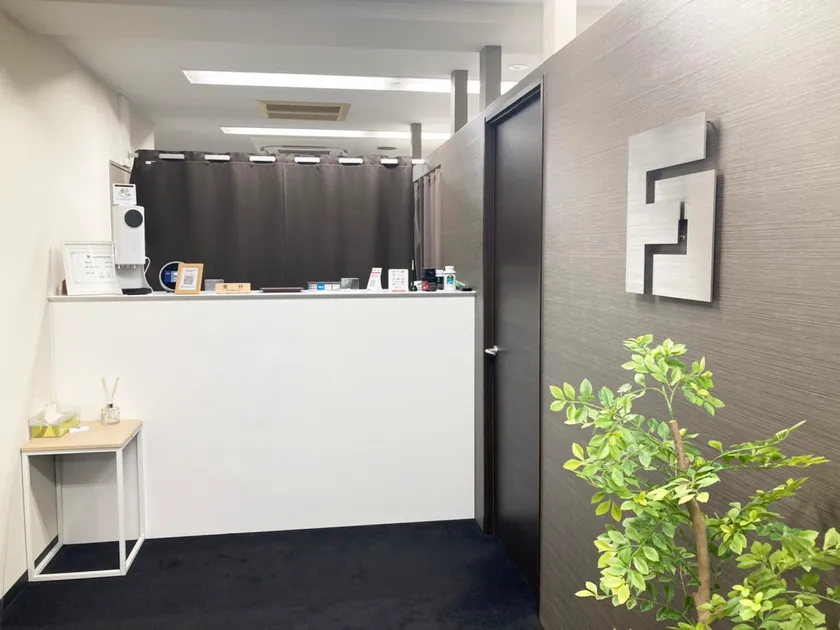
Reception Counter
Fit Clinic offers online medical services and speedy prescriptions.
We provide an environment that makes it easy for patients to receive treatment, and we offer optimal treatment plans that "fit" each individual patient with high quality and low cost.
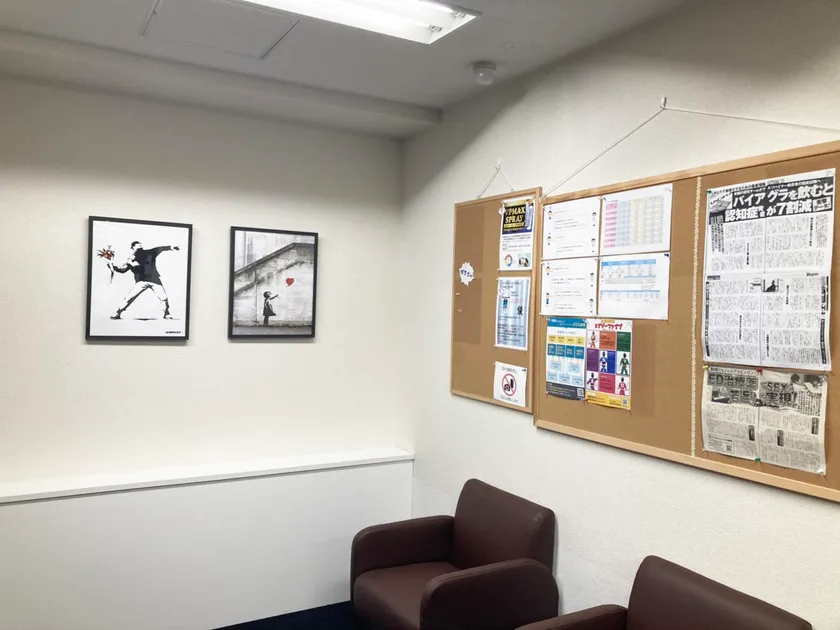
Separate waiting rooms for men and women
Fit Clinic aims to provide safe and effective treatment for serious problems related to physical and mental health and quality of life (QOL) with little burden on the patient and with little cost to the patient.
The Fit Clinic's medical services include
Smoking cessation treatment
ED treatment
Hair loss treatment (AGA/FAGA)
Afterpills (emergency contraceptive pills)
STD testing and treatment
Features of the Fit Clinic:
・Online medical care can be completed in about 10 minutes! Easy appointment by phone, web, or on line!
・Smoking cessation treatment, ED treatment, AGA treatment, after-pill prescription, and STD testing and treatment at low prices
・Online medical services are available 24 hours a day, 365 days a year, from anywhere in Japan.
Outline of Fit Clinic
Operating Information: General Incorporated Association Medical Fit
Clinic name: Fit Clinic Shibuya Sasazuka
Location : 5F Village Sasazuka III, 1-30-3 Sasazuka, Shibuya-ku, Tokyo 151-0073, Japan
Official website : https://fit.clinic/
Opening hours: Monday - Saturday 10:00 - 20:00
Sundays and holidays: 10:00-18:00
Reservations are accepted 24 hours a day, 365 days a year.
- Category:
- Research & Reports
